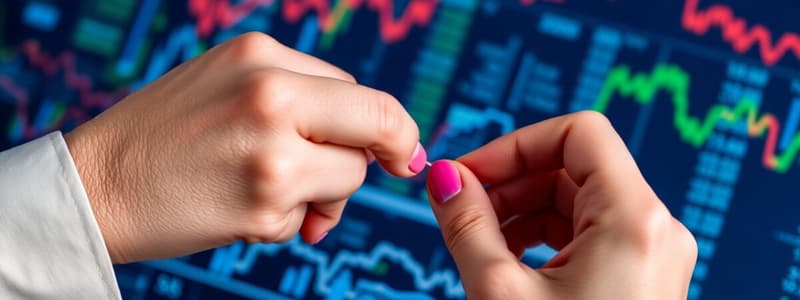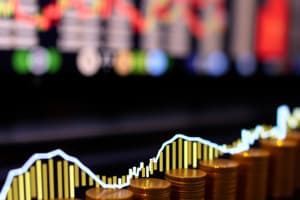Podcast
Questions and Answers
What does the holder of the floating leg in a swap pay their counterparty?
What does the holder of the floating leg in a swap pay their counterparty?
- The fixed interest rate multiplied by the notional amount
- The expected capital gains on the underlying asset
- The average market price of the underlying asset
- The total dividends paid out by a selected underlying asset (correct)
What is the typical value condition at the signing of a swap contract?
What is the typical value condition at the signing of a swap contract?
- The value of the fixed leg is equal to the value of the floating leg (correct)
- The value of the fixed leg is zero
- The value of the floating leg is predetermined to be lower
- The value of the fixed leg is higher than the floating leg
How do dividends compare to price movements in share prices from a risk management perspective?
How do dividends compare to price movements in share prices from a risk management perspective?
- Dividends influence risk management equally to price movements
- Dividends have a minor impact compared to price movements (correct)
- Dividends have a greater impact than price movements
- Dividends are irrelevant to risk management strategies
What type of forwards consider the payments and reinvestment of dividends?
What type of forwards consider the payments and reinvestment of dividends?
What is the term for the buyer of an options contract?
What is the term for the buyer of an options contract?
What is an asset swap primarily used for?
What is an asset swap primarily used for?
What does a call option give the holder the right to do?
What does a call option give the holder the right to do?
What does an investor achieve by buying a floating rate note and entering a swap?
What does an investor achieve by buying a floating rate note and entering a swap?
In a reverse asset swap scenario, what does an investor do?
In a reverse asset swap scenario, what does an investor do?
What is meant by the term 'strike price' in options trading?
What is meant by the term 'strike price' in options trading?
How is 'in-the-money' defined in terms of an options contract?
How is 'in-the-money' defined in terms of an options contract?
Which of the following best describes asset swaps?
Which of the following best describes asset swaps?
Which element contributes to the extrinsic value of an option?
Which element contributes to the extrinsic value of an option?
What is a European-style option characterized by?
What is a European-style option characterized by?
What determines the pay-off when an option expires?
What determines the pay-off when an option expires?
What does the term 'premium' refer to in options trading?
What does the term 'premium' refer to in options trading?
What is a key characteristic that differentiates futures from forwards?
What is a key characteristic that differentiates futures from forwards?
What advantage do forward contracts have over futures contracts?
What advantage do forward contracts have over futures contracts?
Which of the following represents a disadvantage of using forward contracts?
Which of the following represents a disadvantage of using forward contracts?
In the context of hedging, why might a company prefer forward contracts?
In the context of hedging, why might a company prefer forward contracts?
How are the rates for forward contracts determined?
How are the rates for forward contracts determined?
What is the implication of not marking to market for forward contracts?
What is the implication of not marking to market for forward contracts?
What can lead to low liquidity in the forwards market?
What can lead to low liquidity in the forwards market?
What aspect of forward contracts might discourage some participants?
What aspect of forward contracts might discourage some participants?
What occurs to a knock-in option when the underlying asset reaches a predetermined price?
What occurs to a knock-in option when the underlying asset reaches a predetermined price?
What defines the payoff structure of a binary option?
What defines the payoff structure of a binary option?
What defines an interest rate swap?
What defines an interest rate swap?
Which option allows the holder to choose whether it will be a call or put at a predetermined time?
Which option allows the holder to choose whether it will be a call or put at a predetermined time?
Which type of swap involves exchanging fixed interest payments?
Which type of swap involves exchanging fixed interest payments?
What best describes a compound option?
What best describes a compound option?
What happens to a knock-out option when the underlying asset reaches its predetermined price?
What happens to a knock-out option when the underlying asset reaches its predetermined price?
In a fixed/floating swap, which rate typically represents the changing interest rate?
In a fixed/floating swap, which rate typically represents the changing interest rate?
What type of option is a rainbow option also known as?
What type of option is a rainbow option also known as?
What is not a feature of a floating/floating swap?
What is not a feature of a floating/floating swap?
What happens at each payment date in a fixed/fixed swap?
What happens at each payment date in a fixed/fixed swap?
What will happen if the share price of ABC falls below the strike price of 700p for a long call option?
What will happen if the share price of ABC falls below the strike price of 700p for a long call option?
What is the largest type of swap in the derivatives market?
What is the largest type of swap in the derivatives market?
Which of the following is a characteristic of calls on calls as a type of compound option?
Which of the following is a characteristic of calls on calls as a type of compound option?
How often does interest accrue in a fixed versus six-month floating swap?
How often does interest accrue in a fixed versus six-month floating swap?
Which statement correctly describes a characteristic of swaps?
Which statement correctly describes a characteristic of swaps?
What is indicated by a narrow bid/offer spread in a market?
What is indicated by a narrow bid/offer spread in a market?
Which of the following factors contributes to a liquid market?
Which of the following factors contributes to a liquid market?
How is volume defined in the context of liquidity?
How is volume defined in the context of liquidity?
What effect does high liquidity typically have on trading costs?
What effect does high liquidity typically have on trading costs?
Which characteristic is NOT associated with a liquid market?
Which characteristic is NOT associated with a liquid market?
What is 'open interest' in relation to liquidity?
What is 'open interest' in relation to liquidity?
What role do derivatives exchanges play in promoting liquidity?
What role do derivatives exchanges play in promoting liquidity?
What term describes the market's ability to absorb sudden shifts in supply and demand without significant price changes?
What term describes the market's ability to absorb sudden shifts in supply and demand without significant price changes?
Flashcards
Long
Long
The buyer of an options contract.
Short
Short
The seller of an options contract.
Call Option
Call Option
An option giving the holder the right to buy an underlying asset for a specific price (the strike price) on or before a specified date.
Put Option
Put Option
Signup and view all the flashcards
Strike Price
Strike Price
Signup and view all the flashcards
Settlement Price
Settlement Price
Signup and view all the flashcards
Premium
Premium
Signup and view all the flashcards
In-the-Money (ITM)
In-the-Money (ITM)
Signup and view all the flashcards
Forward Contract
Forward Contract
Signup and view all the flashcards
Futures Contract
Futures Contract
Signup and view all the flashcards
Customizable Features of Forwards
Customizable Features of Forwards
Signup and view all the flashcards
OTC Trading of Forwards
OTC Trading of Forwards
Signup and view all the flashcards
Counterparty Risk in Forwards
Counterparty Risk in Forwards
Signup and view all the flashcards
Flexible Margining in Forwards
Flexible Margining in Forwards
Signup and view all the flashcards
Wide Range of Underlying Assets in Forwards
Wide Range of Underlying Assets in Forwards
Signup and view all the flashcards
Availability of Forwards from Banks
Availability of Forwards from Banks
Signup and view all the flashcards
Interest Rate Swap
Interest Rate Swap
Signup and view all the flashcards
Fixed/Floating Swap
Fixed/Floating Swap
Signup and view all the flashcards
Floating/Floating Swap
Floating/Floating Swap
Signup and view all the flashcards
Fixed/Fixed Swap
Fixed/Fixed Swap
Signup and view all the flashcards
Counterparties
Counterparties
Signup and view all the flashcards
Principal Amount
Principal Amount
Signup and view all the flashcards
Legs of the Swap
Legs of the Swap
Signup and view all the flashcards
Reset Date
Reset Date
Signup and view all the flashcards
Knock-in Option
Knock-in Option
Signup and view all the flashcards
Liquidity
Liquidity
Signup and view all the flashcards
Knock-out Option
Knock-out Option
Signup and view all the flashcards
Bid/Offer Spread
Bid/Offer Spread
Signup and view all the flashcards
Market Depth
Market Depth
Signup and view all the flashcards
Binary Option
Binary Option
Signup and view all the flashcards
Chooser Option
Chooser Option
Signup and view all the flashcards
Open Interest
Open Interest
Signup and view all the flashcards
Compound Option
Compound Option
Signup and view all the flashcards
Volume
Volume
Signup and view all the flashcards
Rainbow Option
Rainbow Option
Signup and view all the flashcards
Low Price Elasticity of Demand
Low Price Elasticity of Demand
Signup and view all the flashcards
Liquid Market
Liquid Market
Signup and view all the flashcards
Long Call
Long Call
Signup and view all the flashcards
Illiquid Market
Illiquid Market
Signup and view all the flashcards
Long Put
Long Put
Signup and view all the flashcards
Dividend Swap
Dividend Swap
Signup and view all the flashcards
Total Return Equity Swap
Total Return Equity Swap
Signup and view all the flashcards
Total Return
Total Return
Signup and view all the flashcards
Asset Swap
Asset Swap
Signup and view all the flashcards
Floating Rate Note (FRN)
Floating Rate Note (FRN)
Signup and view all the flashcards
Total Return Forward
Total Return Forward
Signup and view all the flashcards
Fixed Leg of a Dividend Swap
Fixed Leg of a Dividend Swap
Signup and view all the flashcards
Floating Leg of a Dividend Swap
Floating Leg of a Dividend Swap
Signup and view all the flashcards
Study Notes
Futures vs. Forwards
- Futures are exchange-traded contracts, while forwards are typically traded over-the-counter (OTC) with banks or investment firms.
- Futures contracts are standardized, offering fungibility, while forwards offer more customization.
- Futures contracts are marked-to-market daily, with profits paid out daily. Forwards are typically not marked-to-market daily, and profits are paid at maturity, potentially reducing working capital needs for hedging.
Forward Contracts (Example)
- A company with future yen payments can use EUR/JPY forward contracts to lock in exchange rates today for future payments.
- These OTC transactions allow for customized amounts and dates to match specific payments.
- Forward rates are based on the spot exchange rate and interest rate differences between euros and yen. Euro interest rates are often slightly lower than yen, leading to a euro premium or lower cost in forwards.
Advantages of Forwards
- Flexibility in size, date, underlying asset grade/quality, and delivery point.
- Enhanced margin and collateral terms.
- Wider range of underlying assets available.
- Availability from various commercial banks.
Disadvantages of Forwards
- Potential counterparty risk, especially when not cleared through a central clearinghouse.
- Lower liquidity in some cases, due to specialized contracts reducing fungibility.
Options Terminology
- Long (buyer): Owns the option contract.
- Short (seller): Sells the option contract.
- Call option: Right to buy an underlying asset at a specific price (strike price) on or before a specific date.
- Put option: Right to sell an underlying asset at a specific price (strike price) on or before a specific date.
- Strike price/exercise price: Price at which the option can be exercised.
- Settlement price: Price determining option payoff at expiry.
- Premium: Cost of the option to the buyer (non-refundable).
- In/Out-of-the-money: Option profit/loss based on the difference between the strike price and the underlying asset's current price. "At-the-money" signifies breaking even.
- Intrinsic value: Only in-the-money options have intrinsic value.
- Extrinsic value: Option premium beyond intrinsic value, arising from time value, implied volatility, and interest rates.
- Time value: Extrinsic value reflecting the option's probability of increasing in intrinsic value due to remaining time until expiry. Longer expiration dates usually equal higher time value.
- European-style option: Can only be exercised on the expiry date.
- Barrier option: Path-dependent option valuation influenced by the underlying asset hitting a specific price. Knock-in options start existing when the trigger price is reached. Knock-out options exist at outset, but expire when the trigger price is hit.
- Binary/Digital option: Pays a fixed amount or nothing, depending on the underlying asset's price at maturity or certain points before.
- Chooser option: Holder can decide if an option is a call or put at a predetermined time during the option's life.
- Compound option: Gives the right to purchase another option at specific strike prices and dates during its life (calls on calls, calls on puts, etc.).
- Rainbow option/Multi-asset option: Options on multiple underlying assets (e.g., basket of commodities, securities, currencies).
Options Risks, Rewards, and Profit & Loss
- Basic options diagrams (long call, short call, long put, short put) depict profit/loss based on underlying asset prices at expiry.
Liquidity
- Liquidity in equity markets refers to the ease of converting shares to cash. Liquid markets are deep, enabling absorption of supply/demand shifts without major price fluctuations.
- Liquid markets feature narrow bid-ask spreads, reasonable-sized trades without affecting price significantly, and high volumes of buyers/sellers around the bid/ask spread.
- High liquidity encourages trading and reduces trading costs.
Swaps
- Swaps are OTC derivative contracts where two parties exchange future cash flows, based on a principal amount over a period.
- Types of swaps:
- Fixed/floating: Parties swap fixed and floating rate cash flows (coupon swaps).
- Floating/floating: Both payment streams are based on floating rates (basis swaps).
- Fixed/fixed: Parties swap fixed interest rates on the principal.
- Swaps value is typically zero at inception, with the fixed leg usually equal to expected average dividends over the swap's term.
Asset and Total Return Swaps
- Asset swaps facilitate changing interest rate or currency exposure of an investment.
- Total return forwards consider dividend payouts and reinvestment, and the return on the underlying index itself. While dividends impact forwards, their effect is typically minor compared to price fluctuations.
Studying That Suits You
Use AI to generate personalized quizzes and flashcards to suit your learning preferences.




